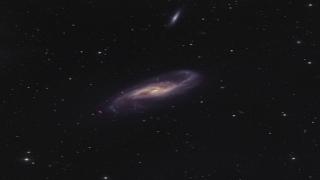Bibcode
Fahed, R.; Moffat, A. F. J.; Zorec, J.; Eversberg, T.; Chené, A. N.; Alves, F.; Arnold, W.; Bergmann, T.; Corcoran, M. F.; Correia Viegas, N. G.; Dougherty, S. M.; Fernando, A.; Frémat, Y.; Gouveia Carreira, L. F.; Hunger, T.; Knapen, J. H.; Leadbeater, R.; Marques Dias, F.; Martayan, C.; Morel, T.; Pittard, J. M.; Pollock, A. M. T.; Rauw, G.; Reinecke, N.; Ribeiro, J.; Romeo, N.; Sánchez-Gallego, J. R.; Dos Santos, E. M.; Schanne, L.; Stahl, O.; Stober, Ba.; Stober, Be.; Vollmann, K.; Williams, P. M.
Bibliographical reference
Monthly Notices of the Royal Astronomical Society, Volume 418, Issue 1, pp. 2-13.
Advertised on:
11
2011
Citations
53
Refereed citations
47
Description
We present the results from the spectroscopic monitoring of WR 140
(WC7pd + O5.5fc) during its latest periastron passage in 2009 January.
The observational campaign consisted of a constructive collaboration
between amateur and professional astronomers. It took place at six
locations, including Teide Observatory, Observatoire de Haute Provence,
Dominion Astrophysical Observatory and Observatoire du Mont
Mégantic. WR 140 is known as the archetype of colliding-wind
binaries and it has a relatively long period (?8 yr) and high
eccentricity (?0.9). We provide updated values for the orbital
parameters, new estimates for the WR and O star masses and new
constraints on the mass-loss rates and colliding-wind geometry.
Related projects

Spiral Galaxies: Evolution and Consequences
Our small group is well known and respected internationally for our innovative and important work on various aspects of the structure and evolution of nearby spiral galaxies. We primarily use observations at various wavelengths, exploiting synergies that allow us to answer the most pertinent questions relating to what the main properties of
Johan Hendrik
Knapen Koelstra